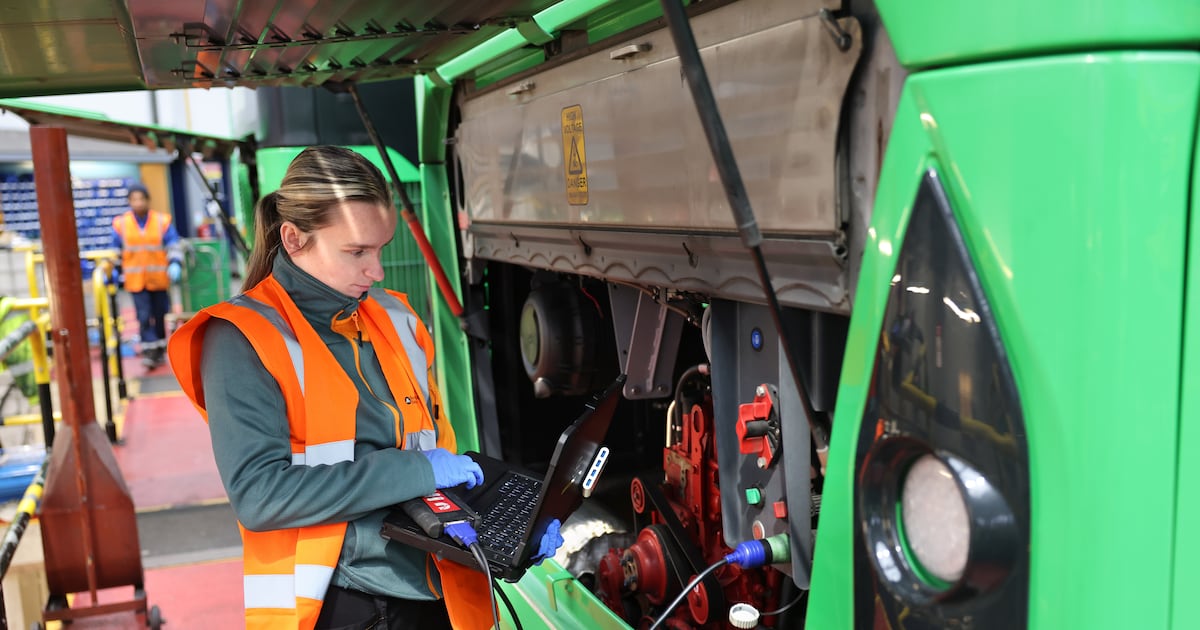Business
Opinion: Apprenticeships should not sit on the margins of the education system

Read more on post.
What will decide Ireland’s future is not only education, technology and investment. It is skills. The ability of people to build, maintain and deliver will be critical in shaping our economy and society in the decades ahead.
Buses may be built in factories, routes may be planned on computers and funding may be approved in offices, but without skilled people to deliver, maintain and operate the system, nothing moves. Behind every bus is a person whose training and skills keeps the city running.
For Dublin Bus, apprenticeships have long been the engine room of success. Our depots are full of people who began their careers in our apprenticeship programme, learning directly from older colleagues who passed on their knowledge.
That intergenerational transfer of skill has been the quiet foundation of reliability for decades.
Now, as we move into the era of electrification and new vehicle technology, apprenticeships are not just important, they are essential.
[ What is an apprenticeship – and what are the benefits?Opens in new window ]
This challenge goes far beyond transport. Across the Irish economy the demand for skills has never been greater. The housing crisis cannot be solved without bricklayers, carpenters and plumbers.
The energy transition cannot be delivered without electricians, fitters and technicians. Even our digital infrastructure depends not only on coders and analysts but on people who can wire, install and maintain the hardware that underpins it.
Ireland, for all its success in attracting investment and developing a knowledge economy, now faces a skills shortage. Too often, our education debate narrows to the question of university places. Of course, higher education is vital.
But we need to rebalance the conversation. The trades are not a fallback option. They are a first-choice pathway to a respected and future-proof career.
An apprenticeship offers something unique. It allows people to earn while learning, to develop practical expertise and to build a skill set. It offers a clear line of sight between effort and outcome. Training today leads directly to progress for society tomorrow.
[ Preoccupation with third level costing the economy, says Dublin Bus chiefOpens in new window ]
We also need to look hard at how our schools prepare young people for these choices. For example, the gender-segregated nature of much of our secondary system means that many all-girls schools do not offer subjects such as woodwork, metalwork or technical drawing/design and communication graphics.
These are the very subjects that often spark an interest in apprenticeships and provide the foundation skills needed to succeed in them. Yet almost all these schools offer home economics.
What was done in 1955, or even 1995, is not right in 2025. If we are serious about promoting equality of opportunity, then every student, regardless of gender, should have access to the full range of practical subjects.
We cannot afford to narrow horizons for our female students and then wonder why the pipeline into the trades is too narrow.
As we approach a presidential election the words of a former president, Patrick Hillery, spoken when he served as minister for education, seem appropriate: “Every child of sufficient talent, be they poor or rich, in any type of school should have the opportunity of climbing right to the top of the educational ladder. The nation needs the services of all the talent it can find.”
That insight is as relevant now as when it was first said. Skills policy is not only about filling labour shortages. It is about giving every child the chance to contribute to their full potential and about unlocking the human capital that Ireland will depend upon in the decades ahead.
To do this, we will need to change how we talk to young people. Parents, grandparents, teachers and mentors all influence career choices. Too often the message is that university is where opportunity lies.
But opportunity also lies in the trades. The young woman who becomes an electrician today could be at the centre of Ireland’s renewable energy future tomorrow.
The young man who trains as a heavy-vehicle mechanic could become the person who makes our public transport system carbon free. These are not side stories. They are the heart of the story.
Apprenticeships should not sit on the margins of the education system. They should be celebrated, expanded and placed at the centre of how we think about Ireland’s future.
Events like World Skills show us what this looks like in practice. I spent a really uplifting day at World Skills Ireland 2025 in the RDS last week. Walking the floor, you could feel the pride, ambition and see the sheer talent on display.
It is an event that deserves far more attention, and far more support, so that it can grow even bigger and better. We should be celebrating these young people as national champions. They are living proof of the value of skills.
At Dublin Bus, we are proud to play our part. Our apprenticeship programme has trained hundreds of people, many of whom have built lasting careers with us. They are the people who keep the capital moving today and they will be the people who lead us into the future of zero-emission transport tomorrow.
But no single company can solve this alone. It requires partnership. Industry, government and educators must work together with urgency and ambition. Funding matters but so does status. We must raise the profile of the trades so that a 16-year-old choosing an apprenticeship feels just as valued as a peer filling out a CAO form.
Buses will not drive themselves, at least not yet. Homes will not build themselves. Infrastructure will not maintain itself. Skilled people will do it. If we fail to invest in them, we will fail to deliver on our national ambitions for housing, transport, climate action and growth.
That is why I keep returning to the same simple refrain. Skills, skills, skills. They will write the next chapter for Dublin Bus, and for Ireland.
Billy Hann is chief executive of Dublin Bus









